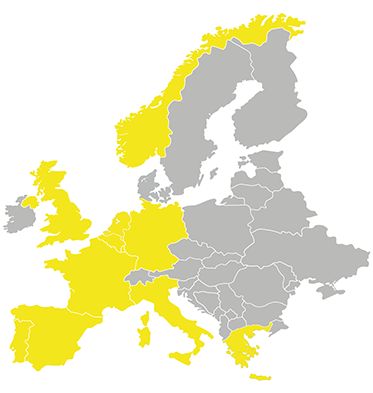What are Associated Countries?
A unique aspect of Horizon Europe is the concept of ‘Associated Countries‘. These are non-EU countries that are part of the European Research Area (ERA) and contribute to the programme’s budget, gaining the opportunity to participate under conditions similar to those of EU Member States. Their participation plays a crucial role in the overall framework, given that scientific research and innovation are increasingly global endeavours, demanding collaboration beyond the conventional geographical and political barriers.
How do Associated Countries benefit from Horizon Europe?
The Associated Countries benefit from and contribute to the Horizon Europe Programme in several ways:
- Collaborative research: Entities from Associated Countries can join consortia in collaborative projects, often taking the lead in specific research initiatives. They bring unique expertise, data, or infrastructural capabilities, complementing the capacities of entities from EU Member States.
- Access to funding: Through their association, these countries gain the privilege to access funding directly from the Horizon Europe programme. This access is vital, especially for nations that might not have the means to finance extensive research and innovation projects. Their contributions to the Horizon Europe budget are calculated based on their gross domestic product (GDP), ensuring a balanced input-output ratio that acknowledges the economic capacities of different nations.
- Policy input and alignment: Associated Countries are involved in the strategic programming of Horizon Europe, albeit with certain restrictions in decision-making processes concerning the programme’s priorities. This participation ensures a degree of alignment between the research and innovation agendas of the EU and the Associated Countries, facilitating cooperation and the collective advancement of science and technology.
- Networking and partnership expansion: Participation in Horizon Europe enables entities from Associated Countries to expand their professional networks, engage in knowledge exchange, and form new partnerships. These connections can lead to collaborative ventures beyond Horizon Europe projects, amplifying the international reach and impact of research and innovation.
- Enhancing global research standards: The association encourages countries to align with the European standards in research integrity, ethics, and scientific excellence. It helps harmonize procedures and quality criteria in research and innovation, fostering a culture of excellence and trust in international collaborations.
Three partners from three different countries
Except in duly justified cases where the work programme otherwise provides, legal entities forming a consortium shall be eligible for participation in actions under Horizon Europe provided that the consortium includes at least:
- one independent legal entity established in a Member State
- two other independent legal entities each established in different Member States or Associated Countries.
The status of an Associated Country is not automatically granted. Non-EU countries must negotiate association agreements with the European Union. These negotiations consider the financial contribution, the extent of participation in programme committees, and other specific terms based on mutual interests. Historically, countries associated with Horizon 2020 (Horizon Europe’s predecessor) included not only those from the European Free Trade Association (EFTA) but also countries from the European Neighbourhood Policy and other global partners. The UK only recently re-joined Horizon Europe as an Associated Country after first solving political disagreements with the EU. Switzerland that would also like to re-join Horizon Europe hasn’t even formally re-started talks with Brussels that could pave the way for association.
Associated Countries are crucial
In the current context of global challenges such as climate change, pandemics, and digital transformation, research, and innovation require transnational solutions and collaborations. The inclusion of Associated Countries in Horizon Europe is not only strategic for the European Union’s ambition to remain at the forefront of global research and innovation but is also crucial for leveraging diverse resources, knowledge, and expertise to address shared challenges. This inclusivity within Horizon Europe symbolizes a commitment to building a world where borders become less of an impediment to the intellectual and cooperative pursuit of advancement and discovery.
Applying for Horizon Europe?
Do you have innovation plans or ideas for a Horizon Europe proposal? PNO’s experts will be happy to help you develop them, find consortium partners, and submit an optimal application. Curious what the Associated Countries are? We have the current list for you. You will also find valuable information in the Horizon Europe magazine. Call 0031 88 838 13 81 or send a message.




